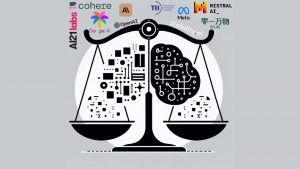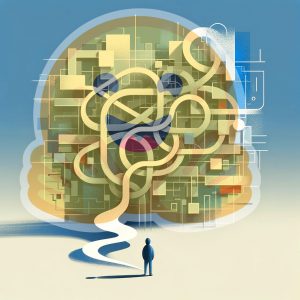The generative AI revolution is reshaping the world as we know it, bringing about incredible opportunities and challenges for businesses across various industries. It’s an exciting time to be a part of this technological transformation, as we witness the power of large language models and their potential to disrupt traditional processes. But how can businesses navigate this rapidly evolving landscape and make the most of the AI-driven future? In this blog post, we’ll explore the disruptive potential of generative AI, the importance of expertise, and how you can prepare your organization for success in this new era of innovation. Join us as we delve into the opportunities and challenges presented by this cutting-edge technology and discover the strategies to stay ahead in the AI revolution.
The disruptive potential of generative AI
Generative AI is poised to bring about a paradigm shift in the way businesses operate, making it a truly transformative technology. Its potential to revolutionize industries by automating digital processes and streamlining operations is already evident in multiple sectors. To name a few:
In advertising and marketing, generative AI opens the door to content generation, ad targeting, and campaign optimization. It will help marketers create highly personalized and engaging campaigns, increasing the return on investment and driving business growth.
Healthcare is another industry that will be impacted by generative AI. Personalized medicine and patient care automation are becoming increasingly more important. This technology opens the door for healthcare providers to deliver better attention to their patients by automating administrative tasks like appointment scheduling and patient record management.
In the education sector, generative AI will be used to create personalized learning experiences and content recommendations for students. Foundational models will enable educators to adapt teaching methods to individual learning styles, making education more engaging and effective. In education too, automating administrative tasks, such as grading and attendance tracking, will free up educators to focus on their core mission of teaching and mentoring students.
So, what do all these industries have in common? The answer is digital process automation, which serves as the driving force behind the revolution powered by generative AI. This technology is enabling businesses to automate complex tasks, making processes more efficient, and allowing organizations to focus on innovation and growth.
As generative AI continues to reshape various industries, businesses will need to adapt to the changes brought about by this technology. This will involve shifts in business models and strategies, placing a strong emphasis on innovation and staying ahead in the competitive landscape. Companies must also embrace the need for continuous learning and adaptation to ensure that they are making the most of the opportunities presented by generative AI.
The importance of expertise in navigating the AI revolution
Generative AI technology is evolving rapidly, offering immense opportunities as well as presenting new interesting challenges. While API access to large language models like GPT-4 or Bard is a valuable starting point, businesses need to consider various aspects of working with these systems. There are many considerations to take into account, such as whether to leverage the few-shot learning capabilities of generative AI through prompt engineering or opt for a more traditional approach using fine-tuningwith training data.
Additionally, open access LLMs have emerged as a significant force in recent months. This has allowed the open source community to reduce the computational costs and improve the quality of those systems. As a result, businesses can now deploy medium-sized LLM models on consumer hardware without the need for specialized hardware or complex setups. This accessibility has opened doors for businesses of all sizes to harness the power of LLMs. Several open-source libraries, including Rustformers/LLM, Llama.cpp, and Text Generation WebUI, have recently emerged in this space, and our team is constantly keeping an eye on new developments in the space.
As businesses navigate the AI revolution, they will encounter challenges such as data privacy, security, and ethical concerns. Successfully addressing these challenges requires adapting strategies and operations to incorporate AI. On the other hand, the opportunities presented by generative AI are immense. Businesses that effectively adopt AI-driven solutions can achieve increased efficiency, cost savings, and a competitive advantage in the market.
To make the most of these opportunities and tackle the inherent challenges, businesses should consider collaborating with experts in generative AI technology. Partnering with knowledgeable professionals can help organizations overcome obstacles and unlock the full potential of AI. Our team comprises experts in the field, well-equipped to support businesses as they embrace the power of generative AI and thrive in this new era.
Preparing for the Future of AI
How can you, as a business leader, prepare your company for the future of AI? The key lies in staying agile and adaptive in the face of rapid advancements in generative AI technology. Embracing a proactive and forward-thinking mindset allows organizations to anticipate changes and harness the power of AI to gain a competitive advantage and secure their position in the market.
One crucial aspect of preparing for an AI-driven future is investing in AI literacy and education. Understanding AI and its potential applications is vital for organizations to make informed decisions about how to leverage this technology. Businesses should consider investing in employee training and development programs related to AI, ensuring that their teams have the knowledge and skills necessary to navigate this rapidly changing environment.
Fostering a culture of innovation and experimentation is another key strategy for thriving in the AI revolution. By promoting an atmosphere that embraces new technologies and ideas, organizations can unlock creative solutions to complex problems and seize opportunities presented by generative AI. Some ways businesses can encourage innovation include providing resources for research and development, setting up cross-functional teams, and organizing brainstorming sessions or hackathons.
Finally, businesses must prioritize data management and privacy as they prepare for the AI-driven future. The growing importance of data in making strategic decisions and powering AI solutions makes effective data management crucial. Organizations should focus on implementing robust data privacy and security measures to protect sensitive information and ensure compliance with relevant regulations.
Wrapping up
As we’ve seen, the generative AI revolution holds enormous potential for businesses across industries, opening doors for innovation, automation, and growth. The key to success in this rapidly changing landscape is understanding the disruptive potential of AI, embracing expertise, and preparing for the future. Organizations must adopt a proactive and forward-thinking mindset, invest in AI literacy, foster a culture of innovation, and prioritize data management and privacy.
In this exciting era of AI transformation, collaboration and knowledge sharing become even more important. Don’t hesitate to connect with others in the field, including us. Reach out, let’s help each other navigate the challenges and seize the opportunities this AI-driven future presents. Together, we can unlock the full potential of generative AI and thrive in this new age of technology.








